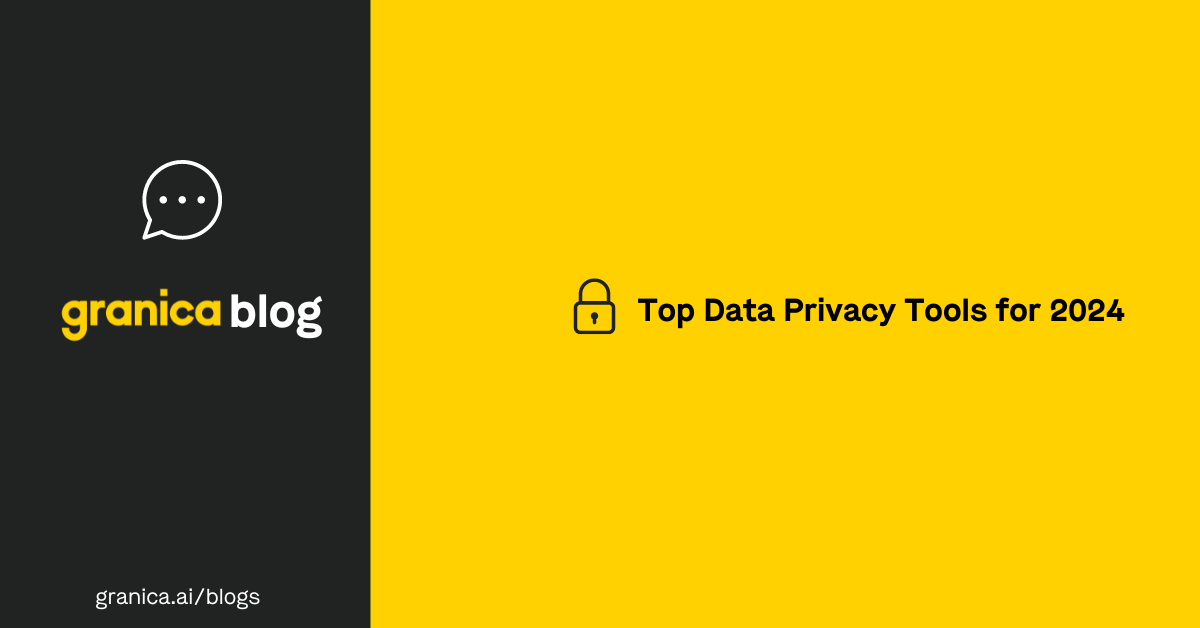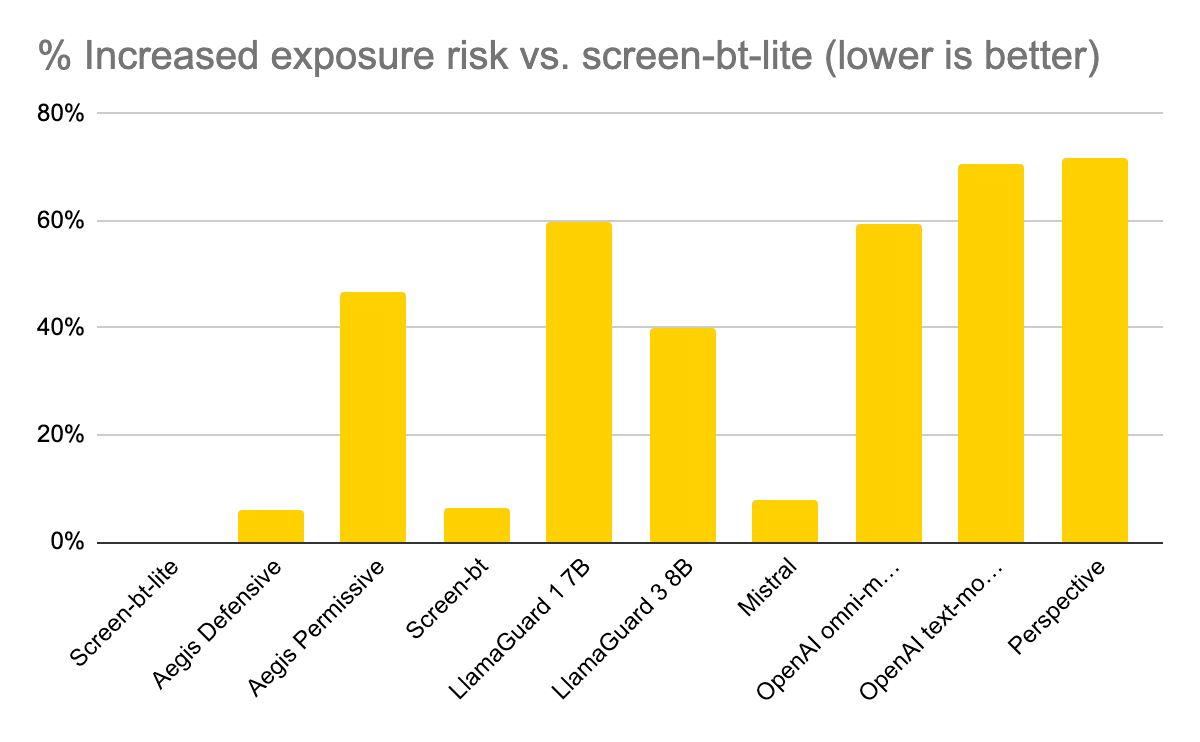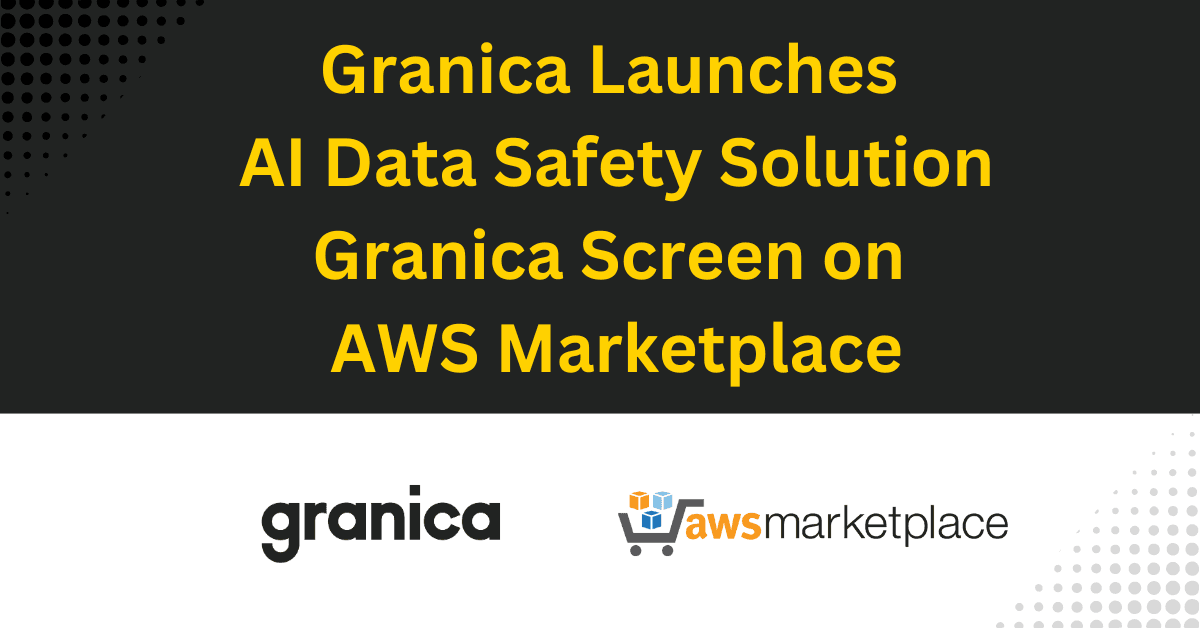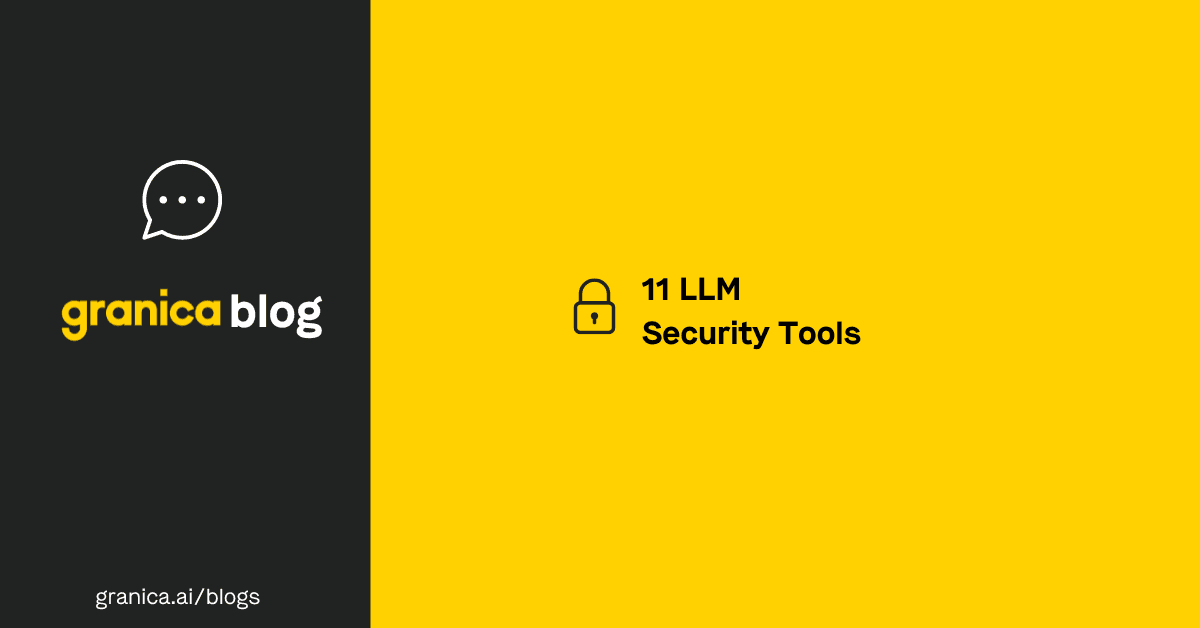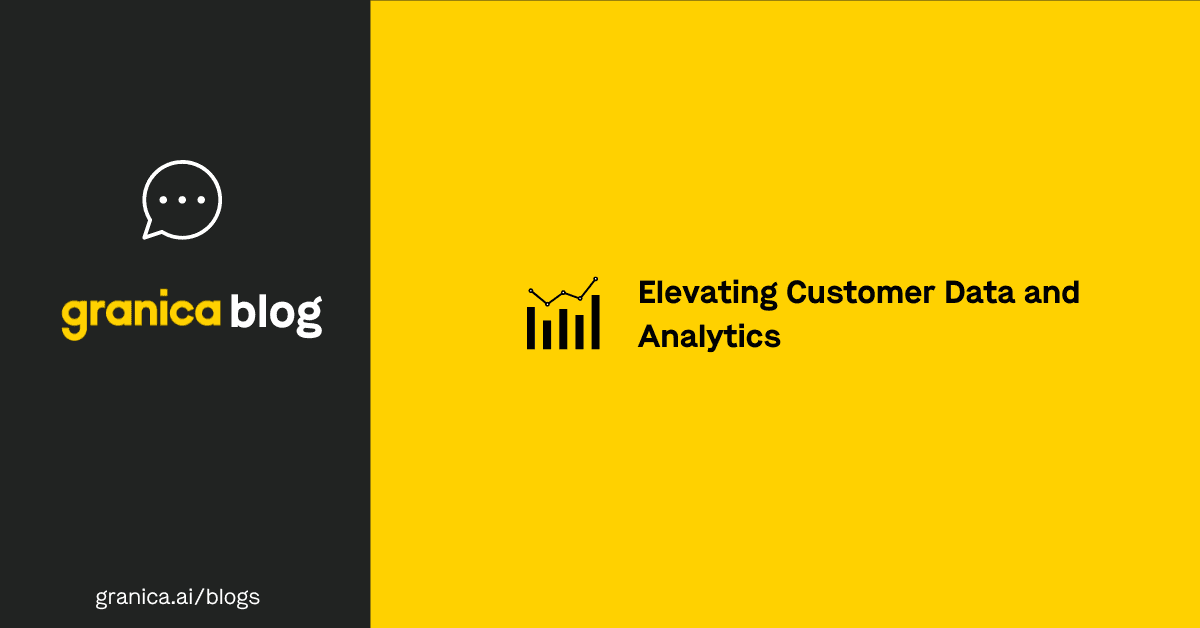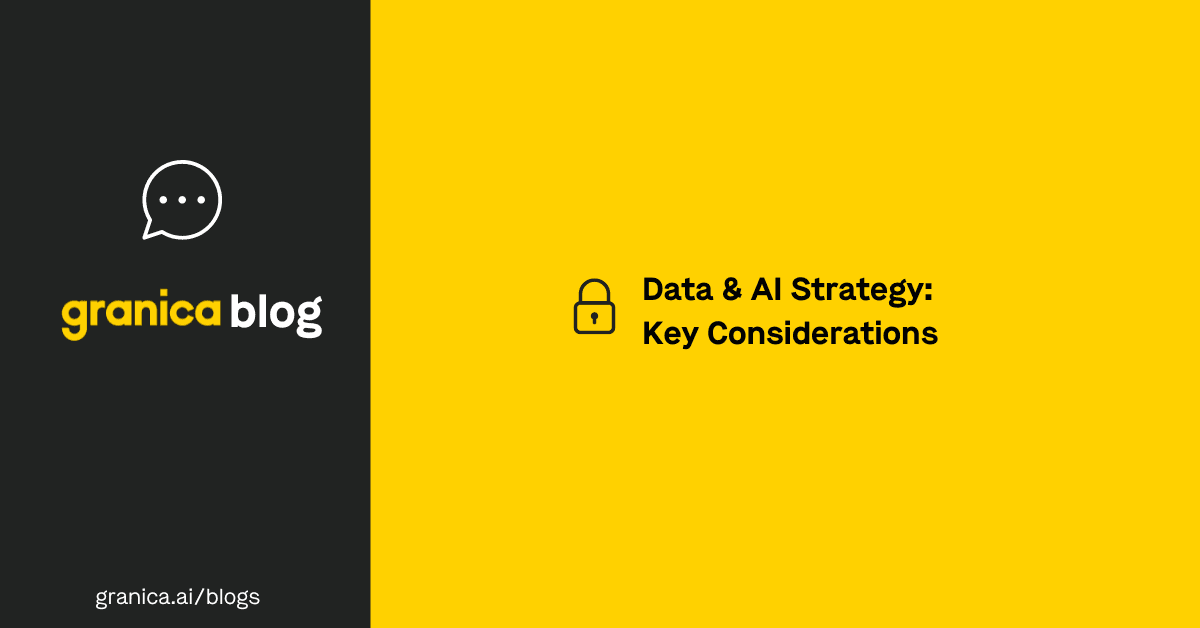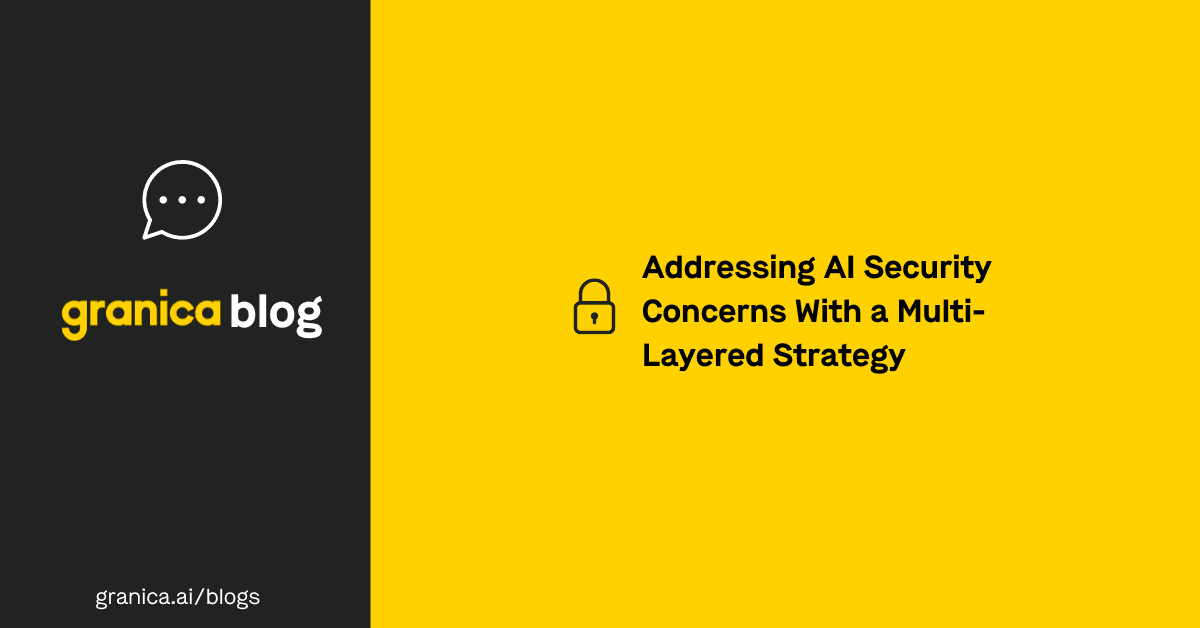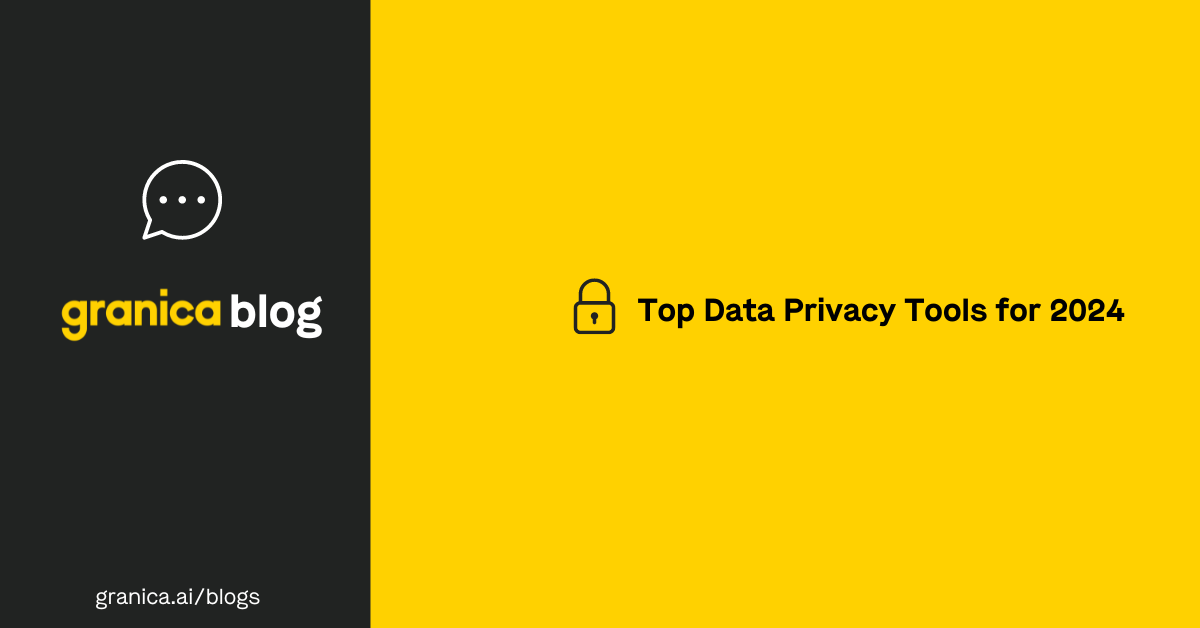
Data privacy is a major concern for organizations in every industry, thanks to frequent high-profile data breaches, new and pending data privacy laws, and an explosion in genAI (generative artificial intelligence) usage. While traditional data security strategies focus on preventing breaches from external hackers or disgruntled insiders, the popularity of genAI and other LLMs (large language models) has shifted the threat landscape.
As illustrated by a recent ChatGPT data leak, LLMs often train on personally identifiable information (PII) that’s either unintentionally scraped from the web or intentionally input by end-users who don’t understand the risks. Companies that build or operate AI models must remove sensitive information from training data and end-user prompts to remain compliant with new and existing privacy laws, but the volume, nature, and unpredictability of genAI training data sets make this a daunting task.
Luckily, tech innovators are rising to the challenge with a large, constantly evolving marketplace of data privacy tools to streamline, automate, and optimize privacy management. This guide compares the top data privacy tools for 2024 to help companies choose the right solution for their unique privacy challenges.
What do data privacy tools do?
Data privacy tools help companies streamline or automate privacy management and stay compliant with any applicable regulations. The most cutting-edge tools allow companies to efficiently manage privacy for extremely large-scale deployments, particularly for LLMs, artificial intelligence applications, and DSML (data science and machine learning) platforms. These tools work in concert with intrusion prevention solutions like network firewalls that protect private data from unauthorized outsiders, and security monitoring solutions like user and entity behavior analytics (UEBA) that prevent data exfiltration by compromised accounts or malicious insiders. As part of a comprehensive security tech stack, data privacy tools help streamline compliance and mitigate breach risks.
Explore how the Granica Screen data privacy tool can help you safely use AI with our interactive demo.
Different solutions can cover a wide range of features and solve a variety of AI data privacy challenges. Below is a list of the most common data privacy features, but many vendors offer additional capabilities that are described later.
Manage Privacy and Achieve Compliance
| Data privacy feature | Description |
|---|---|
| Sensitive data discovery, classification, and masking | Scans AI training data to find sensitive information, classify the data appropriately, and mask personally identifiable information. |
| AI data visibility | Monitors AI data inputs and outputs to identify problems and enable optimization. |
| AI firewall | Protects LLMs and other AI models against attacks, harmful and unethical prompts, and unexpected model behavior. |
| Data encryption | Makes sensitive data unreadable to unauthorized users without a decryption key. |
| Data loss prevention (DLP) | Prevents unauthorized data transfers and, often, helps detect suspicious data movements from potential insider threats. |
| Data privacy/security posture management | Analyzes information about the location of sensitive data, its security controls, who accesses it, and how it’s used to give companies an accurate data privacy and security assessment. |
| Data access governance | Allows security teams to apply and enforce lead-privilege data access policies. |
| DSR and consent management | Streamlines and/or automates Data Subject Request (DSR) processing and consumer opt-ins and opt-outs. |
| Risk prevention, detection, and remediation | Detects vulnerabilities and other security risks; automatically prioritizes issues based on severity; and notifies remediation teams for accelerated response. |
| Data breach management | Analyzes the impact of data breaches and provides logging and recommendations to streamline response efforts. |
Comparing the top data privacy tools for 2024
This comparison is based on an in-depth analysis of the newest, most popular, and most innovative data privacy tools available as of March 2024. When possible, customer reviews from sites like G2 and Gartner Peer Insights provided additional information about each tool’s usability, performance, cost-effectiveness, and support.
Comparison: Top Data Privacy Tools 2024
| Vendor | Capabilities |
|---|---|
| Granica |
|
| Nightfall AI |
|
| Private AI |
|
| Cyera |
|
| TrustArc |
|
| Normalyze |
|
| Arthur AI |
|
| Robust Intelligence |
|
| MineOS |
|
| Securiti AI |
|
| PrivacyEngine |
|
| DataGrail |
|
Granica
Granica is an AI infrastructure platform for building traditional and generative AI that is safe, effective, and low-cost. It is optimized for structured, semi-structured, and unstructured data in AWS and Google Cloud data lakes. Granica Screen offers real-time sensitive data discovery, classification, and masking for both data lakes and end-user LLM prompts. It also doesn’t sample the data it processes, reducing privacy and security risks. Other products include Granica Chronicle AI, a training data visibility service for data lake exploration and cost optimization, and Granica Crunch, a cloud cost optimization service that optimizes the compression of columnar files (such as Apache Parquet) in data lakehouses to lower the cost of storing and accessing large-scale data sets. Granica Screen uses high-efficiency, ML-powered scanning algorithms to process and safely unlock data for training and prompting at high accuracy and without driving up compute costs.
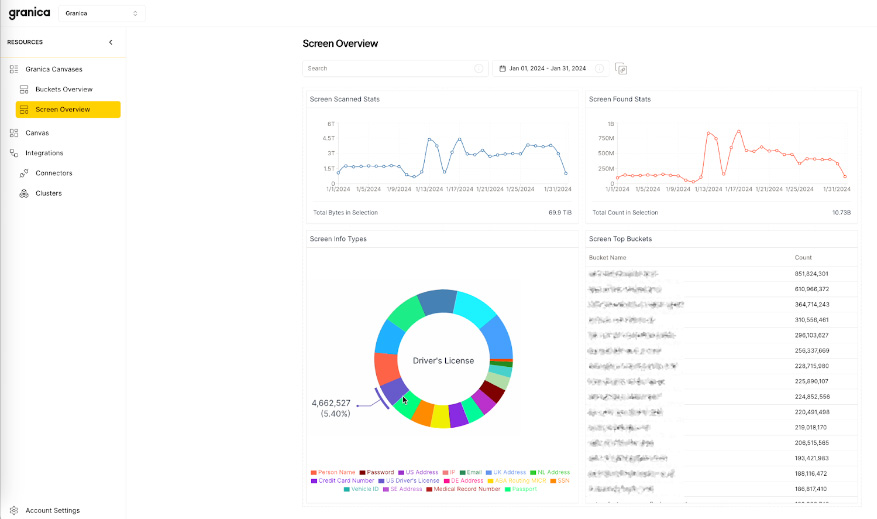
Granica Pros:
- The Granica platform uses novel, high-accuracy scanning algorithms to reduce compute requirements and security risks
- The platform works efficiently with large, unstructured data stores like AWS and Google Cloud data lakes
- The platform offers real-time performance to protect end-user LLM prompts
Granica Cons:
- The platform is technical and CLI/API-oriented, with a limited GUI.
- Cloud-only, not on-premise
Nightfall AI
Nightfall AI is an enterprise data leak prevention platform for SaaS (software as a service), genAI, email, and endpoints. It provides sensitive data discovery, encryption, and exfiltration protection. It also serves as a unified platform for sensitive data mapping and management across SaaS applications. Nightfall AI customers appreciate that the platform is relatively easy to use, and the vendor’s sales and support staff are exceptionally helpful, even if notifications are a little noisy and some detection services can be slow.
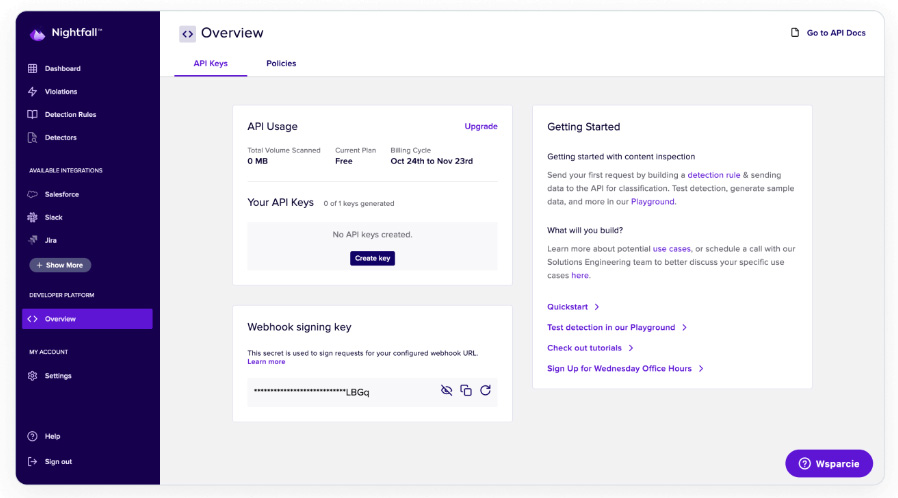
Nightfall AI Pros:
- The Nightfall AI platform is relatively simple to configure and operate
- Customers report an excellent sales and support experience
Nightfall AI Cons:
- Notifications can be noisy
- Some detection services may be slow or buggy
Private AI
Private AI offers data discovery, masking, anonymization, and replacement for on-premises environments. It uses PrivateGPT, a proprietary de-identification technology for LLMs to detect personal information in 10+ file types with very high accuracy. Customers report that the Private AI interface is easy to use and that its detection services are just as accurate as the vendor claims, though its high compute requirements make it expensive to operate, and its data sampling may create security concerns due to the risk that a platform breach could expose sensitive information.
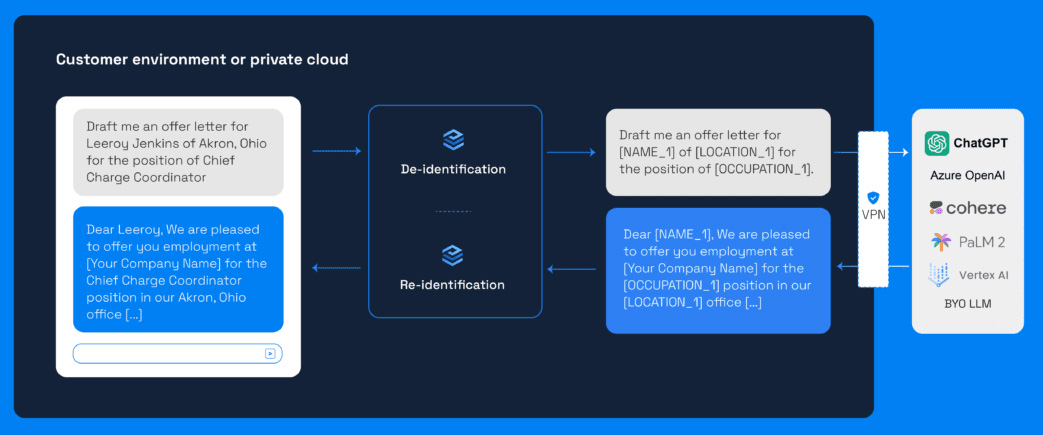
Private AI Pros:
- Private AI’s data detection is highly accurate
- The user interface is easy to use
Private AI Cons:
- High compute requirements
- Samples data, creating security concerns
Cyera
Cyera is a cloud-native data security platform for IaaS (infrastructure as a service), PaaS (platform as a service), and SaaS environments. In addition to sensitive data discovery and classification, Cyera offers data visibility, data security posture management, and data access governance to help teams enforce least-privileged access across the organization. Customers praise Cyera’s comprehensive and granular data visibility, as well as its highly accurate data matching and identification capabilities. However, the UI, reports, and dashboards may be too limited for some organizations.
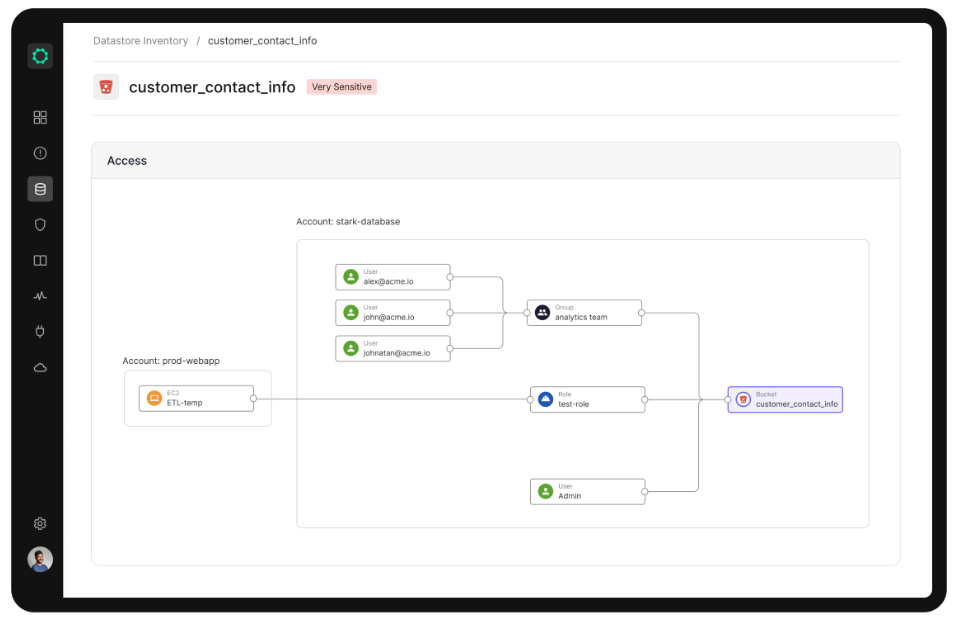
Cyera Pros:
- Cyera provides comprehensive data visibility
- Data matching and identification are very accurate
Cyera Cons:
- The UI doesn’t allow much customization
- Reports and dashboards are limited
TrustArc
TrustArc is a data privacy management solution focusing specifically on regulatory compliance. TrustArc offers consent and consumer rights management (i.e., opt-ins and opt-outs), automated data privacy governance, and third-party privacy assessments for certifications and assurance. TrustArc customers appreciate its user-friendly interface and lightweight networking and compute requirements, but wish its automation capabilities were more unified and that reports contained more features and visualizations.
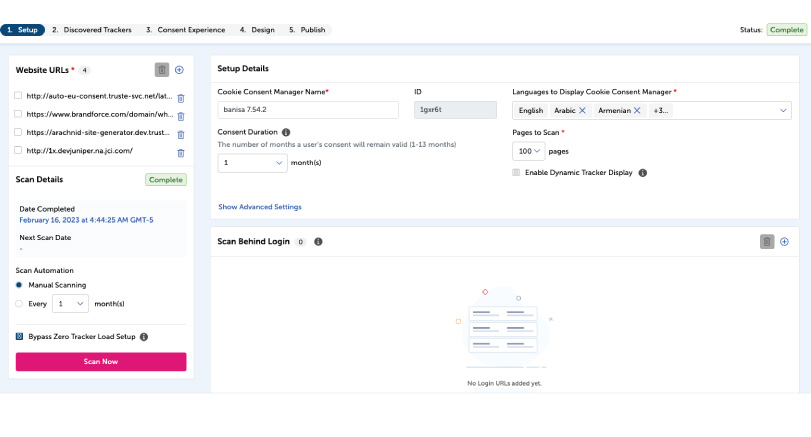
TrustArc Pros:
- TrustArc’s interface is intuitive and user-friendly
- The platform has lightweight networking and compute requirements
TrustArc Cons:
- Automation is disjointed without central orchestration
- Reporting lacks some features and visualizations
Normalyze
Normalyze is an agentless data scanning solution for AI/ML in cloud environments. It offers data discovery and analysis capabilities as well as vulnerability and risk prevention, detection, triaging, and remediation. Customers love Normalyze’s real-time data privacy visualizations, and report that the UI is user-friendly after implementation. However, the initial implementation can be difficult, and the price might be too high for some companies.
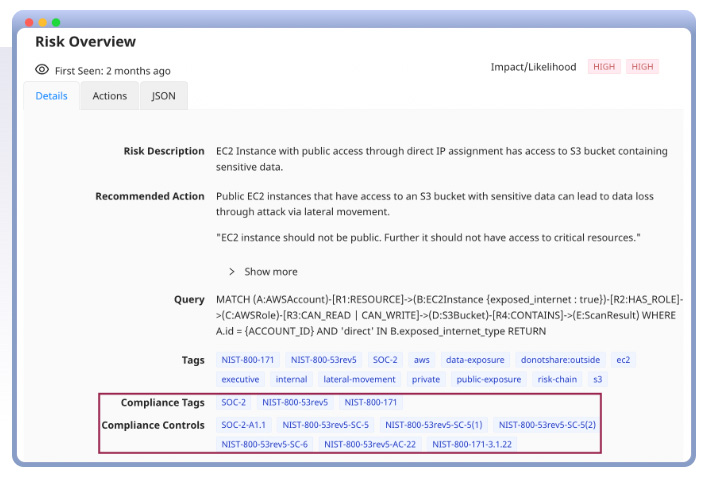
Normalyze Pros:
- Normalyze provides real-time visualizations of cloud resources, identities, permissions, and data stores
- Once implemented, the interface is user-friendly
Normalyze Cons:
- The initial implementation can be difficult
- Product may be too pricey for some businesses
Arthur AI
Arthur AI offers a suite of AI observability tools to help monitor and fix issues with AI models. Products include an LLM evaluation service, an LLM firewall to validate user prompts and model responses, an ML monitoring and optimization platform, and Arthur Chat, which is a turnkey, plug-and-play AI chat platform with an integrated LLM firewall. Arthur AI’s software is very new and continuously updated, so there is limited information about the platform’s look, feel, functionality, and support. However, initial reports indicate the software is very reliable.
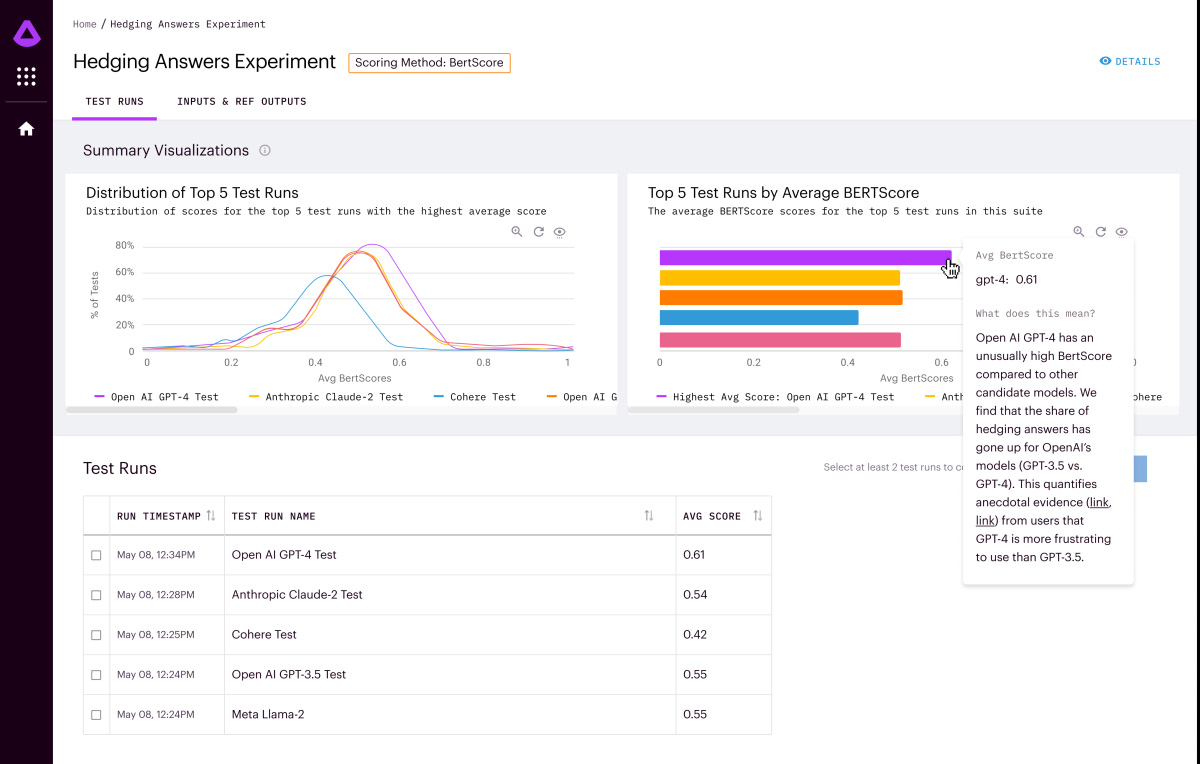
Arthur AI Pros:
- Arthur AI provides reliable AI observability functionality
Arthur AI Cons:
- Products are too new for a detailed analysis of advantages and disadvantages
Robust Intelligence
Robust Intelligence is an AI security platform. Its products include an AI firewall to protect production models, and continuous validation of AI models and data. The continuous validation tool identifies model vulnerabilities, automatically generates model reports, and provides a high-level view of production AI models for regulatory compliance. Robust Intelligence customers appreciate the comprehensiveness of its reporting and insights, which simplifies audits and stakeholder presentations. Some had difficulty implementing the platform and wished there was more documentation to guide them.
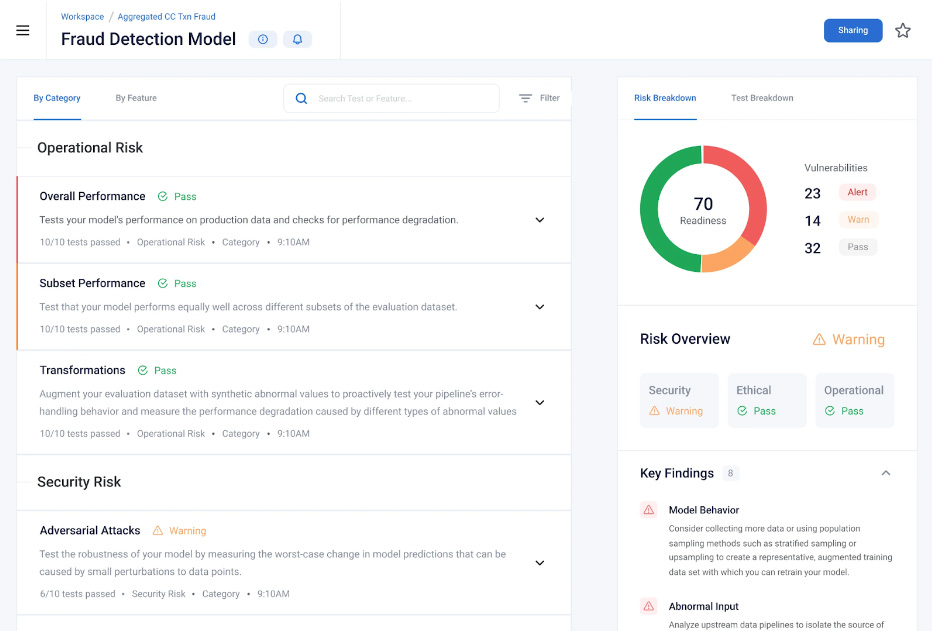
Robust Intelligence Pros:
- Robust Intelligence provides comprehensive reports and insights
- The platform simplifies audits and regulatory compliance
Robust Intelligence Cons:
- The initial implementation might be challenging
- Technical documentation could be improved
MineOS
MineOS is an AI-powered data governance platform. It provides data discovery and mapping, data classification, DSR automation, and consent management features. MineOS also offers AI governance capabilities to discover AI assets, assess AI risk, and extend policy rules to all AI tools. MineOS customers report that the user-friendly UI and customizations simplify data privacy workflows, but there are some limitations around automated integrations.
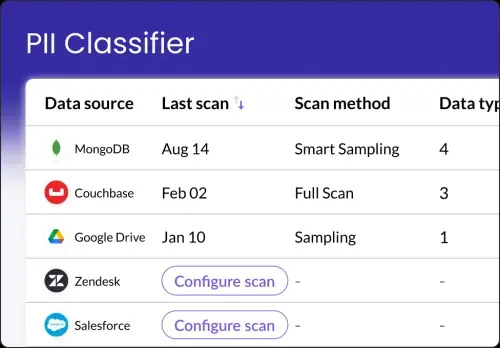
MineOS Pros:
- The MineOS UI is user-friendly and customizable
- MineOS simplifies data privacy workflows
MineOS Cons:
- The initial implementation might be challenging
- Technical documentation could be improved
Securiti AI
Securiti AI offers a comprehensive suite of AI security tools for hybrid and multi-cloud environments. Features include AI security and governance, data privacy automation, data consent automation, asset and data discovery, data security posture management, and workflow automation. Securiti AI also offers unique intelligence capabilities to discover sensitive data, track changes, identify and prevent unauthorized access, and prevent sensitive data sprawl through real-time streaming platforms. Securiti AI’s customers report that the platform is mature, user-friendly, and easily extensible, but that the bug-fix cycle can be long, and it may struggle with large, unstructured data stores.
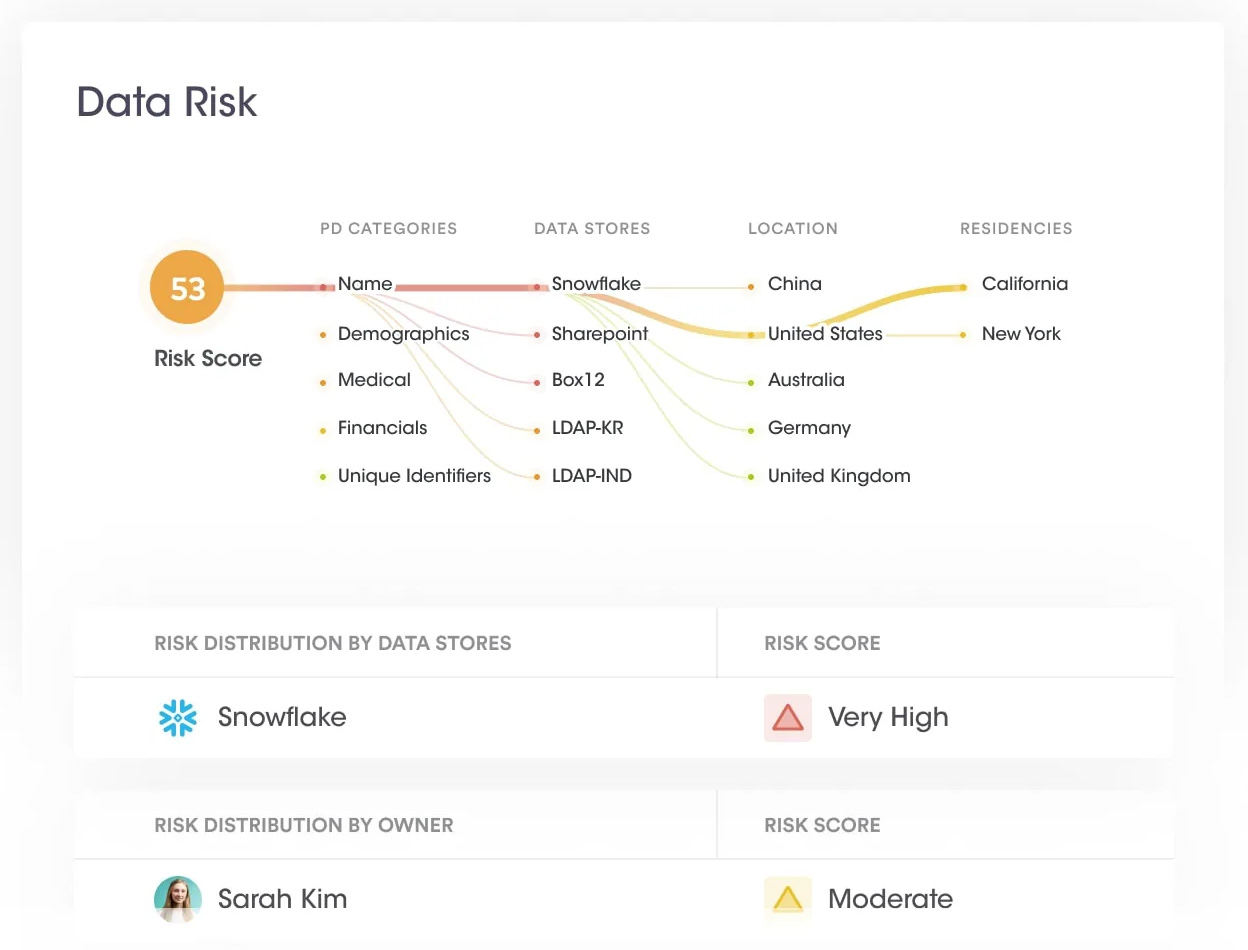
Securiti AI Pros:
- Securiti AI offers mature capabilities and a user-friendly UI
- The platform is easily extensible with configurable connectors
Securiti AI Cons:
- The bug-fix cycle can be long
- The platform may struggle with large, unstructured data stores
PrivacyEngine
PrivacyEngine is a data privacy management solution for the cloud. It offers DSR management, data retention policy management, data processing logging, data privacy risk management, and data breach management and impact assessment. PrivacyEngine also analyzes third-party risks and provides data privacy and security training services. Customers appreciate the user-friendly UI design and the excellent risk library that’s integrated into almost all PrivacyEngine features. However, the reporting may be too technical for stakeholders and senior management, and the platform could use more automated reminders and notifications.
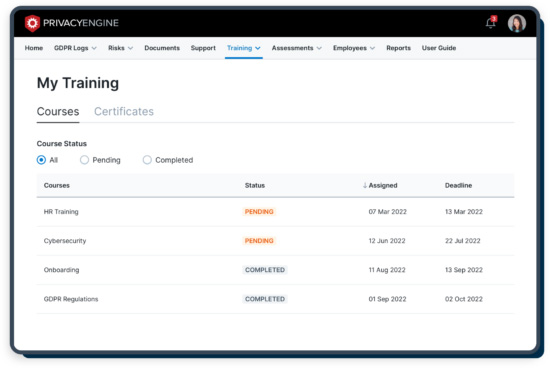
PrivacyEngine Pros:
- PrivacyEngine has a user-friendly design
- An excellent risk library is integrated into almost all features
PrivacyEngine Cons:
- The reporting might be too technical for stakeholders and senior management
- The platform could use more automated reminders and notifications
DataGrail
DataGrail is a data privacy management platform for hybrid and multi-cloud deployments. It provides a real-time data map, automatic DSR management, and data privacy risk management. Customers report that DataGrail provides excellent sales service and support, especially through the initial implementation, and the platform also easily integrates with third-party tools. Their complaints mostly revolve around a lack of customization for consumer-facing items like the DSR form, as well as an inability to bulk-configure system reports.
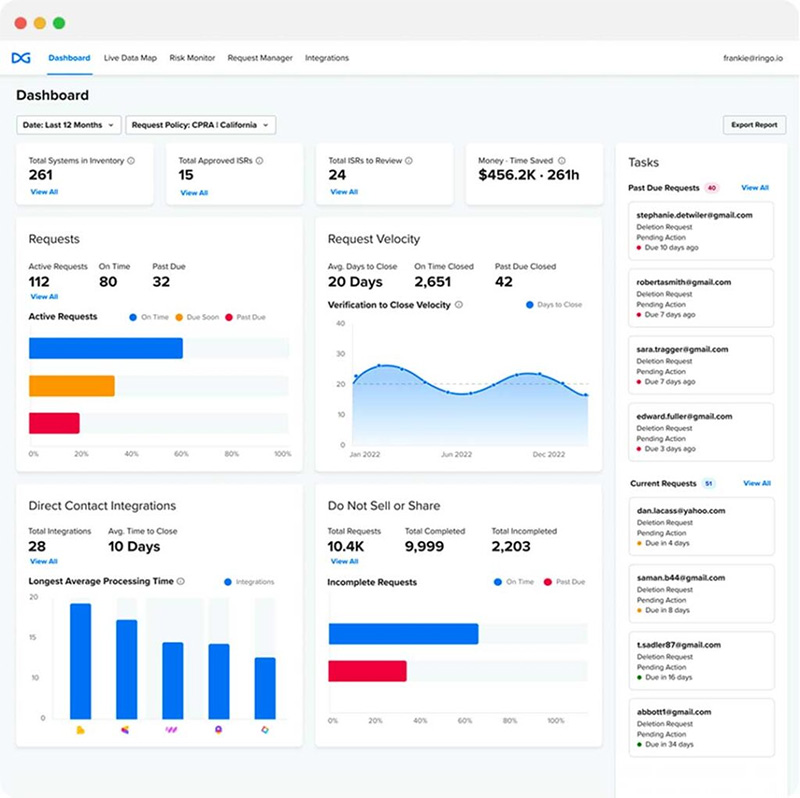
DataGrail Pros:
- DataGrail provides excellent customer service and support
- The platform easily integrates with third-party tools
DataGrail Cons:
- Consumer-facing items like DSR forms lack some customization
- Administrators can’t bulk-configure system reports
AI data privacy and optimization with Granica
The Granica AI data platform provides data privacy, visibility, and cost-optimization capabilities to help companies safely and efficiently unlock data for use with traditional and genAI models. Granica Screen protects data as it’s written into cloud data lakes to reduce protection delays and breach risks while offering high detection precision and fewer false positives. Granica’s novel scanning algorithm is highly compute-efficient, lowering the cost to scan data by 5-10X compared to other data privacy tools and thus enabling data privacy on much larger data sets. Granica Screen is also fast and lightweight enough for use with real-time end-user LLM prompts, providing a single data privacy solution for both high throughput and low-latency environments and applications.
Request a free demo to learn how Granica Screen can solve your biggest DSML data privacy challenges.
